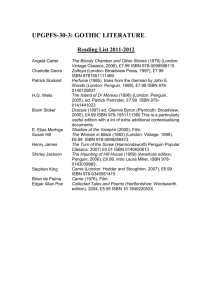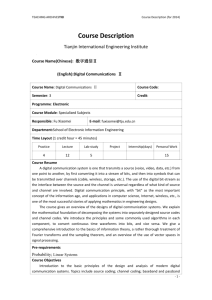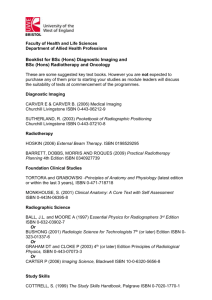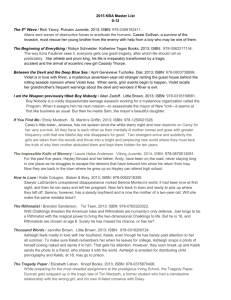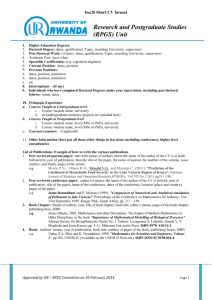Course Description - Blackboard - The George Washington University
advertisement
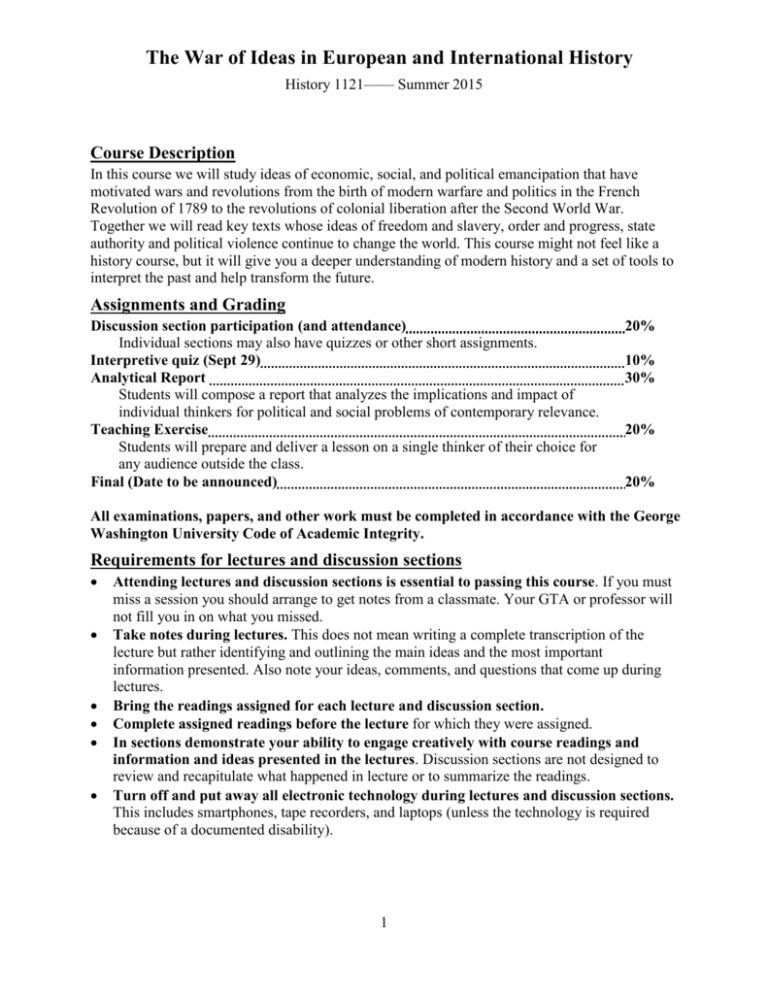
The War of Ideas in European and International History History 1121—— Summer 2015 Course Description In this course we will study ideas of economic, social, and political emancipation that have motivated wars and revolutions from the birth of modern warfare and politics in the French Revolution of 1789 to the revolutions of colonial liberation after the Second World War. Together we will read key texts whose ideas of freedom and slavery, order and progress, state authority and political violence continue to change the world. This course might not feel like a history course, but it will give you a deeper understanding of modern history and a set of tools to interpret the past and help transform the future. Assignments and Grading Discussion section participation (and attendance) Individual sections may also have quizzes or other short assignments. Interpretive quiz (Sept 29) Analytical Report Students will compose a report that analyzes the implications and impact of individual thinkers for political and social problems of contemporary relevance. Teaching Exercise Students will prepare and deliver a lesson on a single thinker of their choice for any audience outside the class. Final (Date to be announced) 20% 10% 30% 20% 20% All examinations, papers, and other work must be completed in accordance with the George Washington University Code of Academic Integrity. Requirements for lectures and discussion sections Attending lectures and discussion sections is essential to passing this course. If you must miss a session you should arrange to get notes from a classmate. Your GTA or professor will not fill you in on what you missed. Take notes during lectures. This does not mean writing a complete transcription of the lecture but rather identifying and outlining the main ideas and the most important information presented. Also note your ideas, comments, and questions that come up during lectures. Bring the readings assigned for each lecture and discussion section. Complete assigned readings before the lecture for which they were assigned. In sections demonstrate your ability to engage creatively with course readings and information and ideas presented in the lectures. Discussion sections are not designed to review and recapitulate what happened in lecture or to summarize the readings. Turn off and put away all electronic technology during lectures and discussion sections. This includes smartphones, tape recorders, and laptops (unless the technology is required because of a documented disability). 1 History 1121, 2 Course Goals. After completing this course, a student should be able to: Explain important events, trends, and processes in the development of European and international political and social thought as they relate to significant historical transformations. Analyze and evaluate political and social thought as abstract information and logical argumentation rather than merely as empirical statements of conviction by great thinkers. Understand and analyze the arguments of European and international political thought as a means of developing and supporting in a logical and persuasive manner students’ own political and ethical projects in the world. Readings The following books have been ordered through the GW bookstore. Please use the editions assigned for this course. G.W.F. Hegel, Phenomenology of Spirit, trans. Arnold V. Miller (1807; Oxford University Press, 1977). ISBN: 978-0198245971 Carl von Clausewitz, On War, abridged edition (1832; Oxford: Oxford University Press, 2008). ISBN: 0199540020 David Walker and Henry Highland Garnet, Walker’s Appeal, with a Brief Sketch of His Life and Also Garnet’s Address to the Slaves of the United States of America (1848; New York: Cosimo Classics, 2005). ISBN: 9781596056213 Mary Shelley, Frankenstein, or, The Modern Prometheus (1818; Dover, 1996) ISBN: 0486282112 Karl Marx, Selected Writings, ed. Lawrence H. Simon (Indianapolis: Hackett, 1994). ISBN: 9780872202184 Georges Sorel, Reflections on Violence (1908; Mineola, NY: Dover, 2004) ISBN: 0486437078 Carl Schmitt, The Concept of the Political (1932; Chicago: University Of Chicago Press, 2007). ISBN: 0226738922 George Orwell, Homage to Catalonia (1938; San Diego: Harcourt Brace & Co., 1980). ISBN: 0156421178. Primo Levi, Survival in Auschwitz: The Nazi Assault on Humanity, trans. Stuart Woolf (1958; New York: Collier Books, 1993). ISBN: 9780684826806 Frantz Fanon, The Wretched of the Earth (1961; New York: Grove, 2005). ISBN: 9780802141323 Hannah Arendt, On Revolution (1963: New York: Penguin, 2006). ISBN: 9780143039907 Mao Tse-Tung, Quotations From Chairman Mao Tse-Tung (1966; San Francisco: China Books & Periodicals, 1990). 083512388X 3 Course Outline 1. (M., 8/25). Introduction to the course 1. Wars against Slavery 2. (W, 8/27). Hegel, Phenomenology of Spirit (1807): Class, conflict, and the psyche. “Lordship and Bondage” paragraphs 166-196 (pp. 104-119) (M 9/1): Labor Day. No classes at GW. 3. (W, 9/3). Hegel, Phenomenology of Spirit (1807): A mind blown by history. “Preface: On Scientific Cognition,” paragraphs 1-41, 63-72 (pp. 1-24, 39-45) 4. (M, 9/8). Hegel, Phenomenology of Spirit (1807): Revolution! “Self-Alienated Spirit. Culture,” Introduction: paragraphs 484-486 (pp. 294-295). On state power and wealth: paragraphs 494-520 (pp. 301-316). Esp. Important: “Absolute Freedom and Terror”: paragraphs 582-595 (pp. 355-363). 5. (W, 9/10). Clausewitz, On War (1832). Book 6, Ch. 26, 184-190; and Book 8, Ch.2 & Ch.6, 223-226, 250-58. 6. (M, 9/15). Clausewitz, On War (1832). Two Notes and Book 1, “On the Nature of War,” 7-69. 7. (W, 9/17). Henry Highland Garnet, David Walker’s Appeal, with a Brief Sketch of His Life and Also Garnet’s Address to the Slaves of the United States of America (1848). Walker’s Appeal (1829) and Garnet’s Life of Walker 8. (M, 9/22). Walker and Garnet. Garnett’s Address to the Slaves of the United States of America (1843) 9. (W, 9/24). Shelley, Frankenstein (1818). 2. Wars against Capital 10. (M, 9/29). Quiz In class: First 30 minutes of George Romero, Dawn of the Dead (1978) 11. (W, 10/1). George Romero, Dawn of the Dead (1978) Film in class: Next 75 mins. (Final 28 mins. optional.) 12. (M, 10/6). Marx, Selected Writings “Economic and Philosophic Manuscripts,” only pp. 54-79. Theses on Feuerbach (1845), pp. 98-101 with Engels, The Communist Manifesto (1848), (selections) only pp. 157-176 Eighteenth Brumaire of Louis Bonaparte (selections) (1852), only pp. 187-191. 13. (W, 10/8). Capital, vol. 1 (selections), (1867), in Selected Writings, pp. 214-300 14. (M, 10/13). Sorel, Reflections on Violence (1908). Introduction; ch. 1; ch. 2, section II (pp. 57-79; 86-92). 15. (W, 10/15). Sorel, Reflections on Violence. Ch. 3, section IV; Ch. 4, sections I-III + pp. 149-50. (pp. 116-18, 119-140; 149-50). History 1121, 4 3. Wars for Humanity 16. (M, 10/20). Schmitt, The Concept of the Political (1932), pp. 3-79. 17. (W, 10/22). Orwell, Homage to Catalonia (1938), pp. 1-85. 18. (M, 10/27). Orwell, Homage to Catalonia, pp. 86-232. 19. (W, 10/29). Levi, Survival in Auschwitz (1947), pp. 9-76. 20. (M, 11/3). Levi, Survival in Auschwitz (1947), pp. 77-174. 4. Wars for Liberation 21. (W, 11/5). Fanon, “On Violence,” in The Wretched of the Earth (1961), pp. 1-62. 22. (M, 11/10). Fanon, “The Trials and Tribulations of Nationalist Consciousness,” in Wretched of the Earth, 97-144. 23. (W, 11/12). Arendt, On Revolution (1963), Introduction and chapter 1. 24. (M, 11/17). Arendt, chs. 2 and 6. 25. (W, 11/19). “The Little Red Book”: Quotations From Chairman Mao Tse-Tung (1966) “Classes and Class Struggle,” pp. 8-22. “War and Peace,” 58-71. “Imperialism and all Reactionaries are Paper Tigers,” 72-81. Film in class: Godard, La Chinoise (1967). first 30 mins. 26. (M, 11/24) In class: Jean-Luc Godard, La Chinoise (1967) No class W, 11/26 (Thanksgiving break) 27. (M, 12/1). Mao, Little Red Book “The Correct Handling of Contradictions among the People,” pp. 45-57. “The Mass Line,” pp. 118-133. “Methods of Thinking and Methods of Work,” pp. 203-229. 28. (W, 12/3). Conclusion, review, recapitulation Final. Time, date, and location T.B.A.


